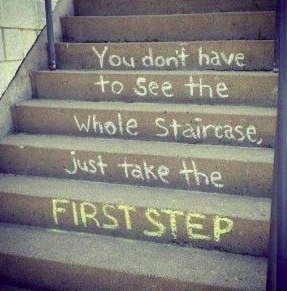Getting over fears & overcoming fear for good
Fear can paralyze even the best of us. It can cripple your train of thought and make you act differently. Overcoming fear is a process for us all, step by step. Facing your fears is a good start on the road to fear recovery.
Learn how to overcome fear and anxiety today! Getting over fears for good: “Get help overcoming fear. Facing your fears is hard. Getting over fears for good is not! Overcoming fears for good can happen. Learn how to overcome fear and anxiety now. Discover powerful ways to overcome fear!”
 The fear of being not loved or different or alone ensnares the soul of every man, woman and child; yet all are the same only in that each is different from the other, and afraid of letting it be known.
The fear of being not loved or different or alone ensnares the soul of every man, woman and child; yet all are the same only in that each is different from the other, and afraid of letting it be known.
Fear causes a double exposure, distorting the true picture with the image fear creates. Fears are the building blocks that make up our walls; knowledge is the chisel, and understanding the hammer with which we break them down.
How to overcome fear
- Fear limits your existence
- Fear creates fear
- Fear is the usual reaction to fear
- Fear stifles true power
- Extensions belonging to fear
The emotions anger, resentment (a further extension of anger), confusion, guilt, shame, jealousy, envy (a further extension of jealousy), hurt, among others, are all extensions of fear. What this means is that when one of these other emotions comes to the surface, underneath it is always the emotion of fear.
Without fear, we are free to see through the once threatening emotions and opinions of others — their walls become windows through which we can see the fears that bind them — and thereby understand their prejudices and cruelties. Without fear, we can experience life without hidden meanings, for it is fear that keeps knowledge hidden. Fear is unnecessary, undesirable, and unreasoning. Everything we do, is done out of either LOVE or FEAR.
Think about this for a moment and I think you will agree. Because of that I want to address the emotion of fear. Think of it this way: Fear is the gatekeeper of your comfort zone. Your comfort zone is whatever is familiar to you. As a child, your comfort zone was your mother’s lap (or in my case crib in a Lutheran orphanage) You ventured away out of curiosity but scurried back to safety when you felt threatened.
Overcoming fear and your comfort zone
Now your comfort zone is the people you already know, the routines you’re used to, the places where you feel at home. Whether these are bad, good, happy, or sad is immaterial. As the saying goes, “Better the devil you know than the devil you don’t know.” People stay for years in bad marriages, boring jobs, and other belittling situations because breaking the bond to the familiar and trying something new feels too scary.
Your comfort zone is what you are comfortable with, where you feel safe. But how satisfying is safe? Fear keeps us from feeling alive when there’s a danger of not being accepted, approved, or understood. Therefore we deny our essential nature. Fear doesn’t know you are an adult that craves adventure, love and fulfillment. That is why a crisis is sometimes what’s necessary to shake your world and give you the courage you need to change your situation.
The crisis in your life that gets you started on the journey from fear to freedom need not be obvious or life shattering a simple nudge or your just plain sick of letting yourself down. Your soul yearns for more.
Facing your fears
This year, try to be willing to see things differently. Willing to experience new ideas. Willing to listen to the people who cheer you on rather than the ones who echo your fears. Willing to have an open heart. Willing to take risks. Because The person sitting in the rocking chair at the end of their life is not regretting the actions they took but the ones they did not.
We all know that things don’t always go the way we want or expect them to go. Plan as we might, practice as we might, sometimes things just don’t go our way. When circumstances take twists and turns we can’t predict, we often feel discouraged. We dwell on the situation or circumstances. But dwelling on the negative produces a negative mindset. It forces us to unwittingly dwell on what’s wrong in our lives instead of focusing on what we can change or do to make things right.
When something goes differently than we had planned or when something that’s difficult pops up unexpectedly, we should allow ourselves to feel the confusion, anger, or whatever other emotion comes along as a result. We should also allow ourselves to vent our feelings to only one person who will not judge or condemn but who will just listen–someone who knows and understands that you are releasing frustration, that you are venting. But once you have vented, prevent yourself from dwelling on the thing that caused the negative emotion by not dwelling on it. When you dwell on it, your mind is focused on the horrible thing.
You will definitely bring yourself down. Instead, after you allow yourself to vent about the situation, allow yourself to pick up the pieces and see where you can go from where you are. What can you do to make things better? How can you respond so that meeting your main priority is still your focus? Think about things that have gone right in your life. Appreciate what you have been able to achieve so far.
By asking yourself questions and remembering past positive moments, your mind accepts what has just happened and moves on to what will happen next. It uses the lessons you just learned as corrective feedback to help you stay on track with your goals or to help you determine a new one.

